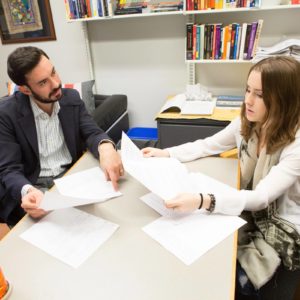A few weeks ago, I participated in an event hosted by Princeton’s Peer Career Advisers called an “Insider’s Look at Internships.” I was there as an ambassador for OURSIP—the Office of Undergraduate Research’s Student Initiated Internships Program. OURSIP makes it possible for Princeton students to pursue unpaid research opportunities over the summer, such as my own, by providing funding to cover anticipated expenses.

The unique thing about OURSIP is that it asks students to take it upon themselves to secure their own internship before asking Princeton for help with funding. As opposed to other Princeton programs, like PICS or IIP, which also assist students in the internship search process as part of the program. As students came up to speak to me about OURSIP at the event, I found that their first question was always, “So what is OURSIP?” and after hearing my description their second, more hesitant question was always, “But how did you find your internship?”
For many students looking for summer research opportunities, the process is quite intimidating. Sometimes it’s hard to decide exactly what field or subfield you are interested in. Even once you decide, there are still so many incredible universities, professors, and labs to work with that it can be overwhelming. So, what is the single easiest and most effective piece of advice I could give? Talk to people, reach out.
One of the easiest places to start is with Career Services. In addition to hosting many informative events like the “Insider’s Look at Internships” that I participated in, the Career Services office offers one-on-one appointments with advisers to guide you in your internship search process. Career Services advisers can help with everything from putting together a resume to identifying Princeton-sponsored programs—like OURSIP—that might be relevant to your interests. However, there are also many other resources on campus that are often overlooked in the internship search process. For example, another easy first stop is Princeton’s Summer Research Programs database.
For me, the first person I reached out to was my academic adviser. I was lucky to have an adviser in the field in which I was interested in finding a position. But even if that is not the case for you, meeting with your adviser can still be helpful since they might be able to refer you to another Princeton professor in your field. Alternatively, you can reach out to professors with whom you have taken classes in your subject of interest. I have found that not only are professors and advisers willing to talk with you, they are excited to do so. They can help you narrow down your interests, refer you to professors that share your interests, and help you reach out to those people.
I came out of my meeting with my adviser with a list of subfields to look into, a list of universities with strong programs in those fields, and a list of professors who could be good fits. I did some more research on all of these things on my own, browsing the psychology and neuroscience department websites of different universities and reading papers written by professors to get a better sense of their research. I came out with a final list of about three professors to contact and, with help from my adviser, I reached out to express my interest in their work. After more in depth email correspondence and interviews, I ended up with an incredibly rewarding and enlightening opportunity.
Finding your own internship doesn’t have to be intimidating. While you should take advantage of Princeton’s summer programs with established internships if they interest you, do not shy away from self-initiated summer opportunities. Not only do these self-initiated internships have the opportunity to improve your formal knowledge and skills within your field, they also enable you to make important connections within your field—connections that may even help you find internship, graduate school, and job opportunities in the future. There are so many people willing to help you along the way and programs like OURSIP to help make opportunities financially possible. All you have to do is reach out.
—Ellie Breitfeld, Natural Sciences Correspondent

